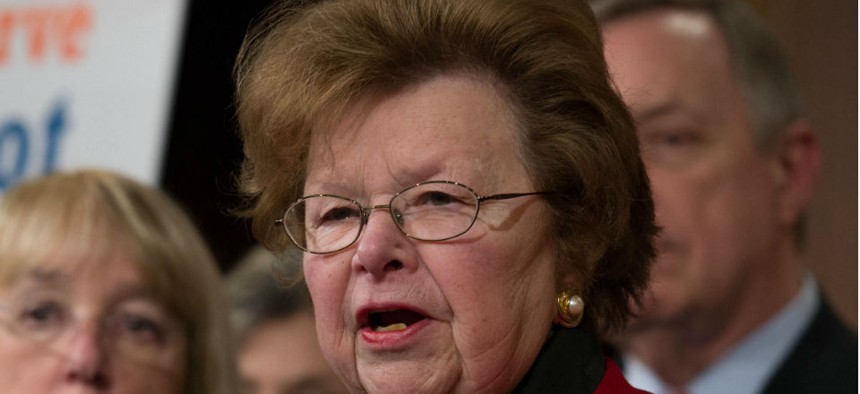
Senate Appropriations Committee Chairwoman Barbara Mikulski, D-Md., was one recipient of a letter calling lower reimbursement rates "misguided and unfair." Flickr user Senate Democrats
Lawmakers Urged to Reverse Planned Cuts to Some Travel Per Diems
Defense civilians on long-term travel will receive less money for lodging beginning on Nov. 1.
Federal employee unions are urging Senate appropriators to reverse planned cuts to the per diems of Defense civilians on long-term travel.
The changes take effect on Nov. 1.
The lower reimbursement rates, designed to save money, are “misguided and unfair,” according to an Oct. 23 letter that 13 unions sent to Senate Appropriations Committee Chairwoman Barbara Mikulski, D-Md., and Defense Appropriations Subcommittee Chairman Richard Durbin, D-Ill.
The groups want the lawmakers to include a provision that defunds implementation of the changes in the bill funding the government after the current continuing resolution expires on Dec. 11. The Appropriations Committee this fall plans to introduce omnibus legislation to fund the rest of fiscal 2015 after the current continuing resolution expires.
The Federal Managers Association, Marriott, Hilton and the U.S. Travel Association also support maintaining the higher per diem rates for long-term Defense travelers. The committee would not comment on the letter or the issue at this time.
The Defense Department has proposed that beginning Nov. 1, employees on government travel to one location for more than 30 days receive a flat per diem rate. For each full day during long-term TDY of 31 to 180 days, the rate would be 75 percent of the locality rate (lodging plus meals and incidentals); for travel lasting more than 180 days, it would fall to 55 percent of the locality rate for each full day.
Another change, which requires incidental travel expenses to now include laundry, baggage tips and ATM fees rather than being treated as separate, reimbursable items, took effect on Oct. 1. That new policy also requires certain expenses, including cell phone use, to be treated as “mission-related” rather than “travel-related” and paid for outside the travel system. That means travelers who want to be reimbursed for cell phone usage will have to file a separate claim with their agency. The incidental expense per diem is $5.
Congress and the Obama administration have told agencies they need to cut travel costs. Still, Republicans and Democrats on Capitol Hill, as well as several unions, believe it will erode morale and cause an undue burden on government travelers. It’s also simply unrealistic, given the increased rates of rental housing and at many hotels, they argue. “The department should not put its workers in a position where they are required to travel for work but have to pay out of pocket for basic necessities,” stated an Oct. 10 letter to Defense Deputy Assistant Secretary for Civilian and Personnel Policy Paige Hinkle-Bowles from 28 House members.
Defense has noted that the commercial lodging industry considers stays over 30 days “extended” and “typically offers reduced rates to ensure occupancy.” The department also is advising Defense travelers to consider staying in furnished apartments or similar types of lodging “which are typically cheaper than room rates in commercial lodging.”
A few commenters on a recent Government Executive story that outlined the changes praised the department for reducing the travel budgets for such trips and preventing some employees from milking the system. “It's about time government-funded TDY expenses are being cut; include Congress in these cuts as well,” said one commenter. “Some TDY is totally unnecessary and a waste of money.”
But others complained the new policy would affect the quality of their housing and safety while on official business. As another Government Executive reader put it, at the lower per diem rates, “you're stuck with Craigslist and renting a room from someone, or staying in a roach motel on a weekly rate.”
The Pentagon is not the only department that has reduced the daily budget for long-term feds on travel. According to a May 15 Powerpoint presentation from the Office of the Undersecretary of Defense for Personnel and Readiness, other departments, including Interior and Agriculture, have reduced per diem rates for employees on extended travel.
In fiscal 2015, the maximum standard per diem rate for Defense travelers in the contiguous United States (including lodging, meals and incidentals) is $129. In more expensive areas, such as Washington, D.C., or San Francisco, the per diem rate is higher.
The General Services Administration establishes per diem rates for lodging, meals and incidental expenses in the continental United States. A standard per diem is applied in locations less commonly traveled by federal workers, while nonstandard areas frequently visited are granted individual rates based on the average daily industry rate. Defense sets the per diem rate for travelers overseas, and in non-foreign areas outside the continental United States.
(Image via Flickr user Senate Democrats)
NEXT STORY: Does the VA Have a Women Veterans Problem?







